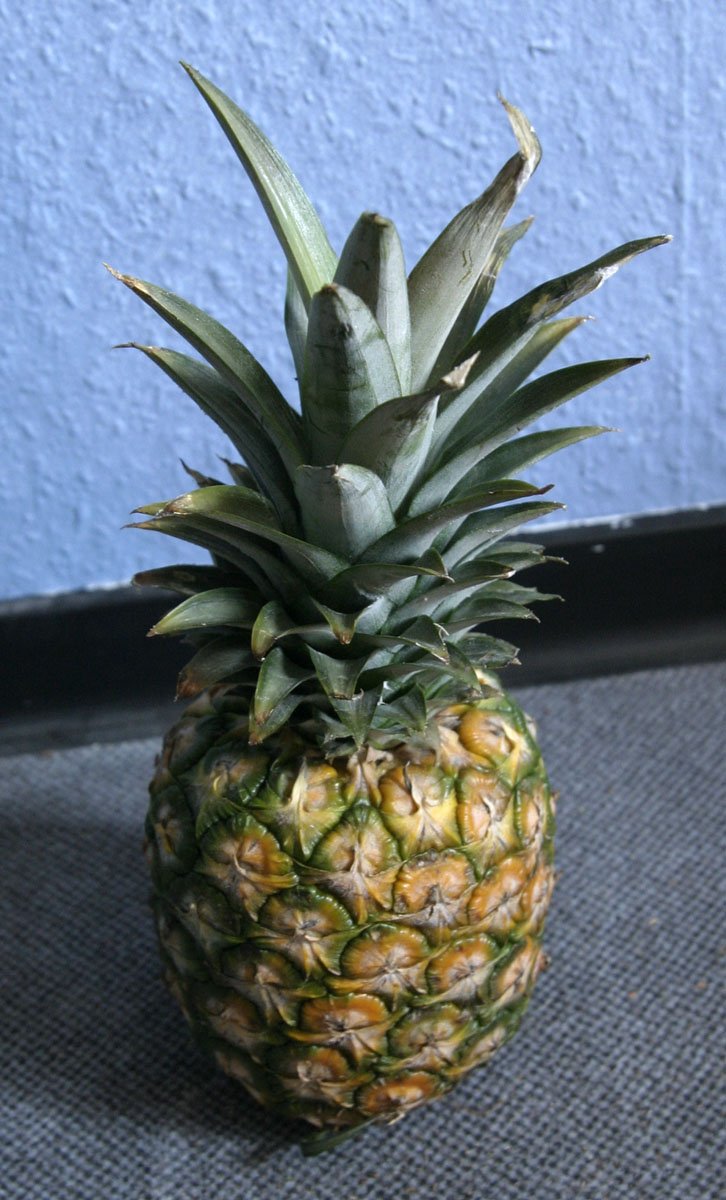We all love to eat the fruit of a pineapple plant (Ananas comosus), but most people do not know that these plants are capable of eating and digesting animal meat. Yes, the pineapple you are eating is really capable of eating animal meat, but it is not a real carnivorous plant at all. So no, it will not be able to get it's revenge on you by eating humans, but it is in fact able to eat flies and other small insects.

A pineapple plant. Image by Eric Guinther, posted with the GNU Free Documentation License.
How the pineapple plant can eat animal meat
The pineapple plant produces an enzyme called bromelain. This protein is found all over the plant, including in the stem, on the fruit (the one you occasionally eat), and in the leaves. Bromelain is a type of protein that breaks down other proteins into polypeptides and amino acids, in this case animal proteins into amino acids. These types of proteins are known as proteolytic proteins.
In order for the pineapple to be able to eat an animal, it must first be trapped by the plant. The pineapple plant does not really have any adaptation to let it trap animals, but the leaves at the top of the fruit is designed to catch water, and every now and then, a small animal like a fly or an ant will get trap there as well. Once this animal begins to chew on the leaf to get out, bromelain is released from the plant into the water that is stored in the leaf-crown, and it dissolves in this water.

A pineapple fruit with the leaves on top of it. This is where it traps water, and sometimes small animals that it consumes. Image by Mutante, posted with the GNU Free Documentation License.
Bromelain will then slowly begin to dissolve the entire trapped animal into amino acids, and the amino acids in the water will slowly be transported back into the plant. This process is very slow in contrast to the real carnivorous plants, and is not really a much used food source for the pineapple, but it is a nice boost to their protein needs that does not require a whole lot of energy to pull off. It is also a good source of phosphorus and nitrogen for the plant. In nature, these elements will be somewhat hard to come by without eating animals, but cultivated pineapples obviously get these from fertilizers.
How does the bromelain affect us when we eat pineapple?
First, let me ask you a question. Have you ever wondered why you become a lot more sore on your tongue when you eat fresh pineapple, compared to the canned ones? Yes, the answer is that the bromelain actually breaks down proteins on the tissues of your tongue, and you will feel sore when you eat them in large quantities. However, canned pineapples are heated before they are canned, and this breaks down the bromelain, so canned pineapples will not break down the tissue on your tongue.
Eating pineapple is not really considered dangerous, but you might end up with a sore tongue if you eat many fresh fruits. Concentrated bromelain is sold commercially, and believed to be used for a lot of different medical problems (but few of these are proven to have any effect), and this concentrated mixture can sometimes be harmful to some people, like pregnant women or people with allergies.
Scientists are really interested in learning more about this protein, and many speculate that is might have lots of different uses, such as tenderizing meat or breaking down tissue medically. Some even claim it might help us fighting cancer, so you might see this protein in the news in the future!
Anyway, unless you are a fly or any other small insect that might get trapped in the pineapple leaves, there is no need to worry about it, so feel free to go ahead and eat a pineapple after reading this post.
Thanks for reading & sources
Thanks for reading my post about the pineapple plant’s ability to eat and digest animal meat. I hope you found the post worth the time it took to read it, and now you have a cool funfact to share with your friends the next time you eat a pineapple!
Here are the sources I used for the post:
- The Wikipedia entries on Pineapples and Bromelain.
- An article by How stuff works: Science.
About the author
Hi, I’m @valth! I live in Norway with my girlfriend, our newborn son, and our two dogs, one of which is seen wearing a bow tie in the profile picture!
I am very passionate about nature and biology, and have been studying ecology for a few years now. My passions are mostly within conservation biology, mycology (the studies of mushrooms), animal behavior and general microbiology. I really enjoy both the theoretical aspect, as well as the more practical aspect of biology, and I spend about as much time in front of biology textbooks as I do spend on finding and identifying plant, mushroom and animal species in the forests.
Make sure to hit the big follow button above to get my posts right in your feed! I get really happy when I see my follower number increase ;)

I will eat pineapple because it is nothing to worry as I am not a fly or insect.
Yeah, us humans don'y need to worry about it at all.
cool